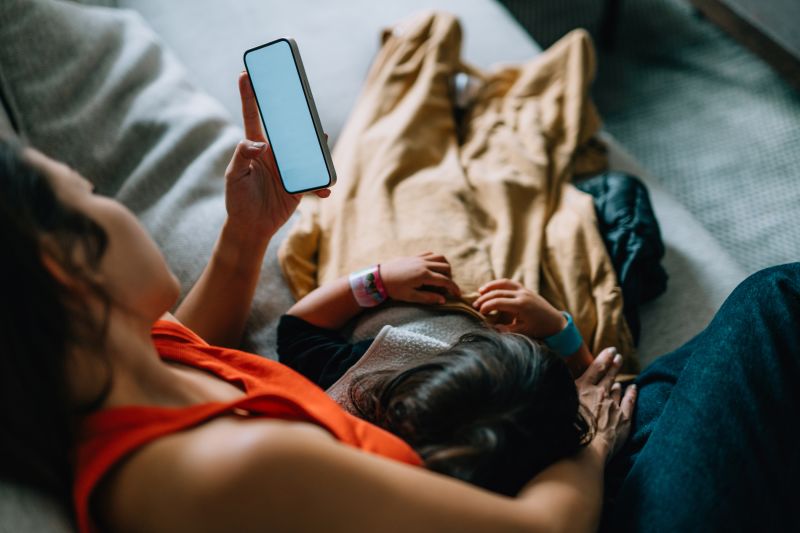When parents are on their phones a lot, here’s what happens to their kids

Parents who stare at their screens instead of talking to their kids aren’t just modeling poor behavior — they could be hindering their children’s language development, a new study found.
Parents who used screens more had children who used screens more — and those children had lower aptitude in grammar and vocabulary, according to a survey of parents of 421 Estonian children between the ages of 2 ½ and 4 years old.
The findings, published Thursday in the academic journal Frontiers in Developmental Psychology, make sense because, as the study noted, verbal interactions with parents are one of the critical ways children learn language.
“We know that when screens are in use — either by a parent or a child — there is less talking, teaching and reading in households — and this may be a reason for the lower grammar skills and vocabulary,” said Dr. Jenny Radesky, co-medical director of the American Academy of Pediatrics Center of Excellence on Social Media and Youth Mental Health. She was not involved in the new research.
What’s more, when kids watched screens with their parents, the study found it didn’t help their language skills. This finding backs up other research that suggests younger children don’t learn well from screens. For example, toddlers ages 24 to 30 months learned new verbs when they were taught them through a live interaction or even video chat, but not by watching a video, according to a September 2013 study.
“Our study shifts (the) focus from just children’s screen time to the role of family screen habits by showing that mothers’ and fathers’ screen use influences children’s language skills,” said Dr. Tiia Tulviste, a professor of developmental psychology at Estonia’s University of Tartu and the lead author of the latest study. “It highlights the need for family-based approaches when managing screen time.”
Other dangers when caregivers are on their phones
Tulviste and coauthor Dr. Jaan Tulviste, a University of Tartu research fellow, collected the data for the new study in 2019 before the height of the Covid-19 pandemic. During the pandemic, many children around the world spent even more time on screens while out of school, both because they were learning online and because many parents gave kids screens to occupy them so they could get their own work done.
Tulviste said the research team is planning a follow-up study to investigate patterns of screen use during the pandemic and the impact on kids’ language skills.
But the negative impact on language development isn’t the only danger kids face when parents and guardians are on their phones, according to past research.
After AT&T’s 3G network was rolled out in different parts of the country, which allowed people to use smartphones, there was a 9% increase in emergency room visits by children younger than 5 years old in those locations, according to a December 2017 study.
One plausible explanation is that caregivers were distracted by their phones and not watching children carefully enough to avoid injuries.
Why everyone is on their phones so much
Some families spend too much time on their phones because they don’t have boundaries such as rules about when everyone needs to put them away, according to Radesky.
“Families tell me it’s the easiest, low-friction default thing to do with their downtime,” she said.
What’s more, Radesky said, past research that she coauthored “suggests that when families are stressed or frustrated with each other, they use screens as an avoidance mechanism.” She also said some parents may give their kids screens because doing so is an easy way to calm children down or occupy them, particularly when they are displaying challenging behaviors.
The American Academy of Pediatrics offers advice on how to calm kids of different ages without screens on its website. For example, with toddlers, the AAP advises parents to try to stay calm themselves, acknowledge the emotion the children seem to be feeling and then help them calm down.
Balancing phones and kids
The research, however, also suggests parents should try not to spend too much time on devices when they are with their children.
“We don’t actually need our phones all the time, every day,” said Lauren Tetenbaum, a therapist and advocate who specializes in maternal mental health and is based in Westchester County, New York. “Try to carve out a few minutes — start with 15 minutes a day if it seems really hard — where your phone is truly out of sight, out of mind. It helps model good practices for your kids and offers parents peace of mind, too. And you get to really focus on your family as you talk about the day.”
One solution I’ve personally used when I need to work on devices as a professor of social media is finding other caregivers for my young children. Sometimes family members will come over and interact with them, or I’ve even hired local teenagers in my neighborhood as mother’s helpers with the charge simply to put their phones away and play with my daughters. Then, when they leave, I do my best to put my devices away and give my kids my full attention.
Of course, hiring childcare support is a privilege many families may not be able to afford, which is why the Estonian study noted that, when parents have lower levels of education, families tend to use screens more.
Tetenbaum also advised parents to reevaluate whether they need to respond to everything that comes through on their phones in real time. “We live in a world where everything seems urgent but usually actually isn’t,” she said. “Try not to put pressure on yourself to be immediately responsive to everything — it’s simply not possible. You’re likely to feel overstimulated, drained and distracted — and then guilty that you’ve been checking your phone instead of hanging with your family.”
But parents should not overstress if they or their child have spent a lot of time on screens, Tetenbaum said. “If you feel like you’ve gone a little overboard with the screens in any given day or week, I believe it’s never too late to repair,” she said. “Spend some extra time reading together and/or in a no-phone zone like the dinner table. No parent is perfect — whatever that means. By caring about your kid’s development and looking into tips like these, you are already doing a great job.”
Research suggests that when parents spend a lot of time on screens, their kids tend to do so as well — and this can interfere with children’s language development and even put them in danger of injuries. Thankfully, there’s an answer for that. By ensuring phones aren’t used as crutches for things like calming children, establishing times when devices are put away and reevaluating the need to respond urgently to every email and notification, parents can establish healthier habits.
Correction: An earlier version of this story misstated the journal title. It’s Frontiers in Developmental Psychology.
Kara Alaimo is an associate professor of communication at Fairleigh Dickinson University. Her book “Over the Influence: Why Social Media Is Toxic for Women and Girls — And How We Can Take It Back” was recently published by Alcove Press. Follow her on Instagram, Facebook and X.







